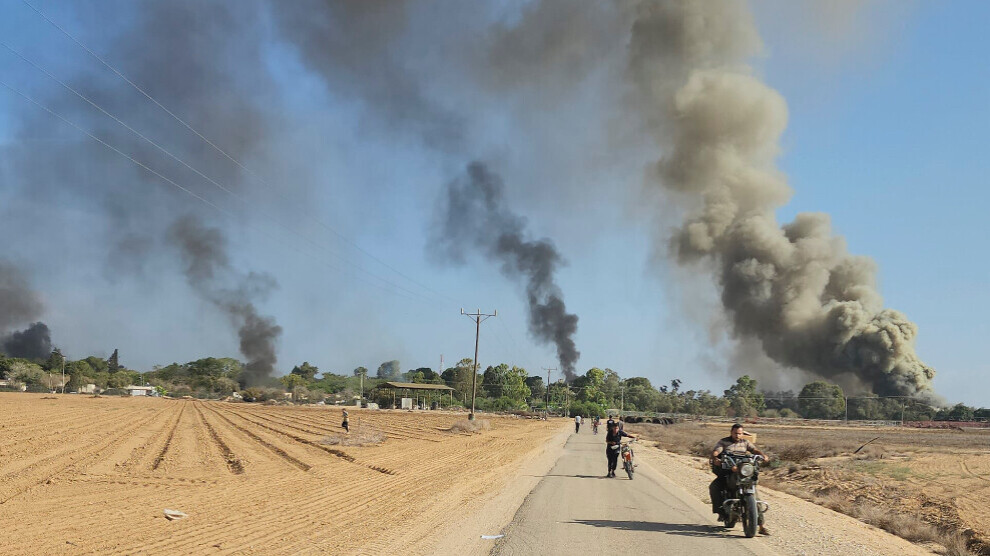Public media; KAN, revealed that Israeli intelligence learned less than three weeks before the 7 October attack that Hamas was planning an attack aimed at capturing "200 to 250 hostages".

ANF
NEWS DESK
Wednesday, 19 June 2024
Less than three weeks before the deadly attack on 7 October 2023 in which nearly 1,200 people were killed, Israel's public broadcaster Kan reported that military intelligence was aware of a Hamas plan to take several hundred hostages in Israel.
According to the report, Unit 8200, the unit responsible for interception activities, prepared a report on 19 September detailing the training of Hamas elite units to raid military positions and kibbutzes in the south of the country.
The media outlet said that intelligence officials within the Southern Military Command responsible for the Gaza Strip were aware of the report, citing unnamed security officials.
The memo from Unit 8200 states that Hamas fighters' training includes attacking military bases and "transferring captured soldiers to company commanders". The memo describes a series of exercises carried out by the Islamist group's elite forces, including mock raids on Israeli towns and border crossings, as well as training on how to take civilians and soldiers hostage and hold them captive. The targets of the attackers are also detailed: synagogues, outposts or soldiers' residences.
The document states that Islamist Hamas aimed for "200 to 250 hostages". On 7 October, Hamas finally kidnapped 251 people. According to the Israeli military, 116 of them are still being held in the Gaza Strip and 41 are dead. On Monday, a senior official involved in negotiations with Hamas said "with certainty" that dozens of hostages are still alive in the Palestinian territory. The official added that Israel would not stop its attacks until all hostages were released under an agreement. According to the latest figures from the Hamas Health Ministry, the war has claimed 37,396 lives and injured 85,523 people, mostly civilians, in less than nine months.
The Israeli military had previously been accused of receiving advance warning that Hamas was planning an attack on its territory. In November, the New York Times revealed that Israeli officials had obtained a document detailing the Islamist movement's plan more than a year before the attack. However, the officials allegedly decided that the scenario was "too ambitious" for Hamas' capabilities.
Israeli Prime Minister Binyamin Netanyahu has steadfastly refused to set up a formal commission of inquiry into 7 October before the current war in Gaza ends.
vi (L), Shin Bet Director Ronen Bar (C) and Mossad head David Barnea (2nd R) attend a ceremony for fallen soldiers and victims of terrorism at Jerusalem's Mount Herzl military cemetery, May 13, 2024. (Gil Cohen-Magen/Pool/AFP via Getty Images)
More Evidence Reveals Israel’s Failure To Pre-empt Hamas Attack
KEREN SETTON
06/19/2024
The IDF Gaza division had warned of Hamas’ planned attack, including forecasting 250 hostages being taken. The document was written three weeks before the attack and was apparently circulated among intelligence officers
Israel’s failure to foresee and preempt Hamas’ surprise offensive carried out on Oct. 7 has been on the minds of many Israelis ever since.
During the attack, approximately 1,200 people were killed, thousands more were injured, and around 250 were kidnapped by the Gaza-based terrorist organization. The assault stunned Israel on the morning of a Jewish holiday when hundreds of terrorists stormed the border, attacking military posts and tranquil communities. The army had not been on high alert, and many soldiers were on holiday. It seemed as if the Israeli Defense Forces (IDF) had completely let its guard down on the border with Gaza, making Hamas’ infiltration attempt a glaring success in their eyes. The immediate response by the army was disorganized and painfully slow, fueling public criticism.
As the dust settled and the scope of the attack became evident, there were increasing reports and testimonies that the army and other intelligence agencies were at least partially aware of Hamas’ intentions and preparations.
On Monday, Israel’s public broadcaster, Kan, revealed a document that showed that the IDF Gaza division had warned of Hamas’ planned attack, including a shuddering forecast of 250 hostages being taken by Hamas. The document was written three weeks before the attack and was apparently circulated among intelligence officers, including at least one high-ranking officer. The IDF did not directly respond to the report but said it was in the process of a general investigation into the failures that led to the disaster.
For Roni Eshel, a surveillance soldier who was killed on Oct. 7 by Hamas terrorists who stormed her base, these revelations are too late.
The feeling that something was going to happen was in the air for a long time. Roni told us, as did other soldiers who told their families, that things weren’t working. Broken surveillance cameras weren’t repaired, holes in the barrier wall with Gaza were left unattended.
“The feeling that something was going to happen was in the air for a long time,” Eyal Eshel, her father, told The Media Line. He has since embarked on a mission to oust the senior military commanders who, he said, ignored warnings from soldiers on the ground. “Roni told us, as did other soldiers who told their families, that things weren’t working. Broken surveillance cameras weren’t repaired, holes in the barrier wall with Gaza were left unattended.”
“When you connect all the dots, it is clear the soldiers were ignored, abandoned, and mostly disregarded by the military echelon. This was a very clear failure,” Eshel added.
The head of the IDF military intelligence unit announced his resignation in April this year as a result of what he said was his responsibility for the failure, which will be remembered as one of Israel’s darkest moments.
Various documents and reports leaked to the media in the aftermath of the attack, as well as witness testimonies, contained warnings of an impending attack. It is still to be determined where these warnings stopped, whether it was an intelligence blunder that misread the signals or whether the intelligence passed on to the army’s more operative ranks did not act upon the warnings.
According to media reports, Hamas exercises that surveillance soldiers saw on the border were dismissed by more senior commanders as being exercises that would never materialize into an actual attack. The sentiment among the defense echelon was that Hamas was deterred and had a vested interest in retaining its power in the Gaza Strip rather than risk a war with Israel that could endanger its hold on the territory.
“From the very beginning, the problem was not with regard to the information, which was there,” Professor Kobi Michael from the Misgav Institute for National Security and Zionist Strategy and the INSS told The Media Line. “The problem was about the interpretation and the analysis of the information.”
“The sad joke among Roni and her friends was who would be on shift the day the raid happens,” Eshel said, adding that his daughter’s direct commanding officers had, themselves, put them on alert for an imminent raid.
Roni Eshel was killed in the Nahal Oz military base, in which more than 60 soldiers were killed, and over a dozen members of the adjacent kibbutz were also murdered. The base has since become a symbol of the Oct. 7 failure, a testament to everything that went lethally wrong.
In the level of the Gaza division, things were known in such a detailed manner. It is very annoying and frustrating that the information was there, and we were not there with the information.
“In the level of the Gaza division, things were known in such a detailed manner,” Michael said. “It is very annoying and frustrating that the information was there, and we were not there with the information.”

Roni Eshel. (Courtesy)
Many of the members of the small Kibbutz Nir Oz, another border community, were killed by over 150 Hamas terrorists who stormed it at 6:30 in the morning. Eighty residents were kidnapped during the attack. Israeli forces arrived on the scene in the afternoon, another bloody testament to the military failure.
“It is not only a question of intelligence but also a question of the operational level,” Michael added. “Why wasn’t the IDF prepared enough and what took so long to reach the areas to provide them with military assistance?”
According to Michael, there are “layers” of responsibility, which include the political echelon.
ENVIRONMENT Too Hot for Peace: Desertification, Global Warming Fueling Middle East Unrest
06/17/2024
Israeli Prime Minister Benjamin Netanyahu, who led Israel successively from 2009 to 2021, with a brief pause until he resumed office at the end of 2022, was a major part of Israel’s policy towards Hamas. The Israeli leader aided in perpetuating the internal Palestinian rift between Hamas in Gaza and the Palestinian Authority in the West Bank, reportedly saying that keeping Hamas in power in Gaza would prevent the establishment of a Palestinian state. Hamas was treated as an asset that could keep Gaza quiet, as Israel ignored the gradual strengthening of the terrorist organization. However, it grew into a monstrous army, which proved its prowess on Oct. 7.
Netanyahu and his political allies have brushed off calls for a national inquiry committee. They claim that wartime is not a time for investigations. But as the Israeli military continues to fight, there is room to learn lessons on the go.
“We are still deep in the sin of hubris, the same since Oct. 7,” said Eshel. “Nothing has been learned, no conclusions have been reached, and there is no inquiry committee yet, and no investigation has begun. We are treading in quicksand.”
Hamas’ threats against Israel were not concealed. In its doctrine, its main aim is to destroy Israel. In the months leading up to its surprise attack, it continued to make explicit threats against the Jewish state, threats that were disregarded by Israel, which thought the organization was deterred.
“Israel has to learn to take its enemies very seriously,” said Michael. “They will build their capacities, and they will build the option for realizing their vision.”
Ever since the initial shock wore off and as the war continues to drag on, there has been increasing pressure from the Israeli public to form an inquiry committee even before the war ends. The army has reportedly already begun at least a partial investigation into the events as an organization that is experienced in reviewing its own actions.
“This is not something that can replace a state-level investigation, which should investigate not only the IDF but also the political echelon, and not only from Oct. 6 but also from the last decade and all the policy, the doctrine, the strategy of Israel vis a vis Hamas, vis a vis the Palestinian arena, and not to blame people…but to find out the failures to draw the right lessons so we can be more prepared for the future,” Michael summarized.
No comments:
Post a Comment